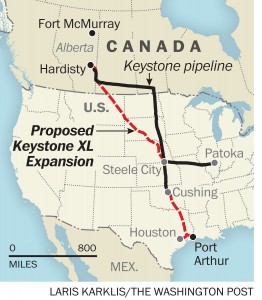This is third and final (for the time being) posting on shale gas. The first post discussed the technology environmental risks entailed. The second post looked at the impact on the global gas market and this one deals with the geopolitical impact that I believe we can expect as shale gas production continues over the next 5-10 years.
Bloomberg reports that shale gas could bring the U.S. close to energy independence in the next twenty years and while more nuanced analysis, such as one posted by Victor Mallet in the Energy Collective, paint a more sober view, the current boom in energy production in the U.S. is likely to increase for at least the next five years and is already changing the nature of geopolitical discourse in the world.

At the time of this writing protests have been ongoing in the Ukraine for the last few weeks, and I understand that the fundamental issue is whether the Ukraine will lean more towards Western Europe or Russia in the years ahead. Europe relies largely on Russian gas and the fact that the European Union is ready to defy Russian interests and openly assist the western leaning opposition has much to do, in my view, with the conviction that Russian gas may not be as important going forward as it has been in the past .

This week there were also inconclusive peace talks in Geneva on the Syrian Civil War and the larger issue in that conflict is what forces will drive the future of the arab world. Shale gas has already had President Obama still has not decided what to do about Keystone XL, an addition to the U.S. – Canadian pipeline network that would allow Canada to export oil from tar sands.
What ties all of these events together in my view is a new geopolitical calculus emerging in part due to the rise of oil and gas production in the United States and the expectation that additional reserves of shale gas will be unlocked in a number of countries around the world including Poland.

Besides the give and take going on in Kiev, for me the most critical impact of shale gas and the resulting possibility of energy independence for the United States, or, North American could be enough to prompt a major re-think of the need to project American military power around the world. The U.S. Navy’s Fifth Fleet is a formidable military force that is stationed in Bahrain. Its explicit purpose is to keep the sea lanes open so that the United States can continue to import gulf oil no matter what happens between the states in the Gulf and in fact kept things moving during the devastating war between Iraq and Iran in the 1980s.
Writing in the Atlantic, Rutgers University’s Toby Jones says its time to disband the fifth fleet as it has served its purpose. Would the United States pull back form the gulf if oil as not required? How would such a disengagement affect broader policy goals in the Middle East?


